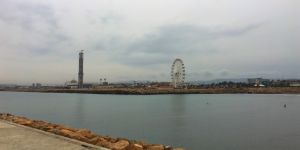
Driving in Algeria implies some conditions and regulations. Find out more about these in this article.
Foreigners moving to Algeria will probably want to drive during their stay, whether it is a long or short stay. But beforehand, it is recommended to inquire on the country's regulations and conditions regarding driving, as well as on the road conditions for safe driving.
In general, you will be allowed to drive in Algeria with your national driver's license if you are making a maximum of three months stay. Hence, you are not required to convert your driver's license into an international driver's license.
International driver's license
In case you intend to make a long term stay in Algeria, you are advised to obtain an international driver's license in your home country prior to moving. In fact, Algerian police officers are likely to request you to produce this document during traffic controls. The international driver's license can be obtained from a Touring Club office by producing the following documents:
- your original driver's license
- a certified copy of your driver's license issued by your home town hall
- two recent passport size photos
- a 500 dinars stamp
- booking fees (some 1,000 dinars).
The international driver's license is valid for three years.
Converting your driver's license
If you are planning to stay longer, you can as well convert your national driver's license into an Algerian driver's license. Documents to be produced are your national driver's license along with driving competency certificate issued by your home town hall. You will need additional documents such as a request form which has to be notarized by your new host city's municipality, your birth certificate, a residence certificate, a medical certificate proving that you are fit to drive (that is, you do not have vision problems), a document stating your blood group, three passport type photos and a 200 dinars tax stamp.
Learning to drive
The Highway Code examination is an oral test consisting of a series of primary and secondary issues. Unlike the European driving examinations, the Algerian version is not limited to a number of playoff fouls. For instance, poor response to a primary issue can lead to failure while ten mistakes to secondary issues can be overseen. Note that you will have a minimum of two months between the oral examination and the driving test. You are also required to wait for at least one month before taking part to the driving examination.
Documents to be produced to apply for the driving examination are the following:
- a duly filled and signed application form, notarized at the nearest town hall to your place of residence
- your birth certificate
- a residence certificate
- a copy of blood group card (for Algerian nationals)
- a medical certificate proving that you are not visually impaired and you are fit to drive
- 6 passport-size photos
- tax stamps.
Validity
Since the introduction of the points system in November 2012, the driver's licence has to be renewed every ten years. Once you have completed the driving test, a probationary driver's licence will be issued with a two years validity period.
For renewal, you will have to produce the above-mentioned documents along with the expired driver's license.
Speed limits
Speed is limited at 50 km/h in urban areas. When it rains, the speed limit is reduced at 40 km/h.
On some urban main roads, speed is limited at 80 km/h while in the outskirts, it is limited at 100 km/h in general and at 80 km/h during rainy or humid weather.
Finally, speed is limited at 120 km/h on the highway and at 100 km/h during rainy weather.
Road infrastructure
Algeria is known for hosting Africa's biggest road infrastructure. It includes two Trans-African Highway networks, namely the East-West Highway which runs from Cairo to Dakar and the Trans-Saharan Highway which connects six African countries. Note that the East-West Highway also connects Annaba, in the east, and Tlemcen, in the west, as well as bigger Northern cities such as Oran, Bejaia, Algiers, Constantine, etc.
However, you will not be able to access to Tunisia and Morocco as the road is blocked. You will have to travel there by air.
Useful links:
Ministry of Interior ' Driving www.interieur.gov.dz
Town Directory' Town halls in Algeria www.annuaire-mairie.fr
Touring Club of Algeria www.touring-algeria.com
Expat.com ' Algeria Driving schools Directory
Expat.com ' Algeria Transportation Forum
We do our best to provide accurate and up to date information. However, if you have noticed any inaccuracies in this article, please let us know in the comments section below.







Comments